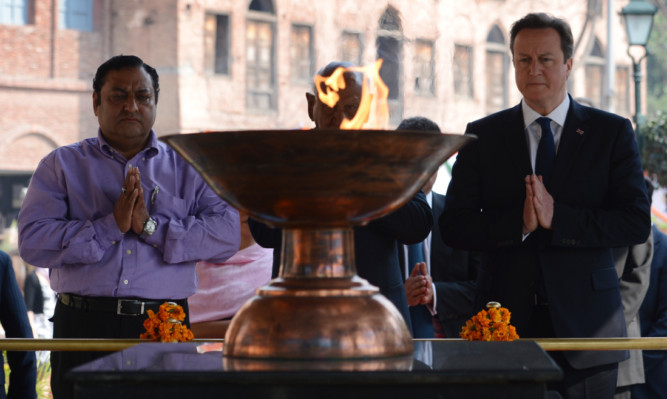David Cameron has laid a wreath at the memorial to the 1919 Amritsar massacre in India.
Writing in the memorial book of condolence, Mr Cameron described the massacre as “a deeply shameful event in British history”, adding “we must never forget what happened here”.
He is the first serving Prime Minister to visit the Sikh holy city in the north-western state of Punjab, the scene of the most notorious atrocity in Britain’s imperial history in India.
Troops under the command of British Brigadier-General Reginald Dyer shot into a crowd of thousands of protesters, including women, children and elderly people, until their ammunition ran out.
An inquiry commissioned by the Raj colonial authorities found 379 people were killed in the public gardens of Jallianwala Bagh, though this figure has been widely challenged by Indian sources, who put the death toll at 1,000 or more.
The atrocity helped fuel Mahatma Gandhi’s struggle for Indian independence and is seen by historians as a crucial turning point on the road to the end of British rule in India.
In 1997, the Queen laid a wreath at the memorial and described the massacre as a “distressing” example of the “moments of sadness” in Anglo-Indian history.
However, Mr Cameron’s words were far stronger. “This was a deeply shameful event in British history, one that Winston Churchill rightly described at the time as ‘monstrous’,” he wrote.
“We must never forget what happened here and in remembering we must ensure that the United Kingdom stands up for the right of peaceful protest around the world.”
Mr Cameron made his entry in the book of condolence seated at a table before a memorial plaque which read: “This place is saturated with the blood of those Indian patriots who were martyred in a non-violent struggle to free India from British domination.”
Mr Cameron was shown around the site of the massacre by descendants of some of those who came under fire in 1919.
They pointed out walls where bullet holes can still be seen and the Martyrs’ Well, where many people died after seeking shelter from the volleys of bullets.
The Prime Minister viewed a flame which burns continuously at the memorial in honour of the fallen.
Speaking after the visit, the memorial’s secretary Sukumar Mukherjee, whose grandfather survived the shootings, was asked if Mr Cameron’s words constituted an apology.
He replied: “He has come here, he has paid his tribute here. It is more than an apology.”
However, other descendants were not so happy. Sunil Kapoor, whose great-grandfather died, said: “If you feel shameful then why not make an apology?”
Mr Cameron later explained why he decided not to apologise. “In my view, we are dealing with something here that happened a good 40 years before I was born, and we are dealing with something that… the British Government rightly condemned at the time,” he said.
